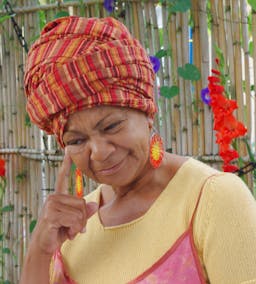When it's not Funny
May 28, 2019
Story
“You’ve got a chip on your shoulder”, or“Can’t you take a joke?”.
Common responses when one dares say something in a social gathering, to something which strikes the core of your being, which you cannot laugh along with, something which will spoil the mood if uttered, which will turn you into a wet blanket.
I do so know what it’s like when one is the only one present who will hold up that mirror, as Amy says in her article (https://www.worldpulse.com/en/community/users/amyloganauthor).
I was sitting surrounded by good English women and their gentlemen at an English tea party, in the south of France. I was the only South African. I was the only black person. I was also the only black woman.
My heart somersaulted first, before my head registered, a remark coming from a woman next to me at the table: “Well, I’d like to see for myself someday exactly how big black men’s whatsit’s are”, followed by loud laughter all round.
“What’re you talking about?” I faced the petite lady on my right, my heart now thumping, for I had a premonition of what was coming.
“Oh come-on, Monica”, she said, eyes on the rest of them, all waiting for the next witty remark. “You know that black men have these enormous …..”! followed by more loud laughter.
My face blanched. My heart pounded in my ears and my throat went dry. Unfortunately I was not able to let it go for the sake of social acceptability.
I jumped up, facing the lot of them.
“Sorry, but I can’t laugh”. I was close to tears, upset. “You’re talking about my son, my father, my brothers!” I could think of nothing else to say. I walked away from that table.
Result? I told my Englishman husband what had happened later. He shrugged and said “I understand, dear, but it’s not done to insult someone at their own table. Bad manners”.
The woman’s husband, next time I saw him, said “You really upset my wife you know, Monica!”
I am still confused. How do I hold up the mirror, I wonder, without being a damp squid? How do I not respond immediately when my heart is telling me to, when I know that I shall not have the guts to say anything after the event because my head will not let me? How does one do it?
At the advanced age of 72 years, I struggle with this all the time, for I am so often accused of still carrying the Apartheid ‘chip on my shoulder’; of not having moved on, not having learnt how to ignore the anger which comes up in me when I see exploitation.
Like when the man in a public square in the south of France kicked (kicked!) this little boy no more than 3 years old in front of everyone on a summer’s day out. How could I ignore my heart which was shouting in anger, and my body which catapulted me into the man’s path? The little French I know deserted me as I tried to express my anger. I switched to English, pointing my finger, accusing him of being all sorts of bastards. I was livid.
The result? The square went quiet. Everyone stood about watching. My partner disappeared into the crowd. The man’s woman (I hope she was not the mother of the child; I shall never know) stood by without saying a word. Until some other person came in front of me, pushed me away as if the assaulter-of-young-children was being attacked by me, saying loudly:
“Il est un domestique, pas votre affaire, madame!” (It's a domestic, not your affair, madam!)
What does one do? I walked away, crying for the young boy, my myself, for us.
How does one stand up, speak up, when this is what you know you want to do but society expects otherwise? We believe we have a duty to speak up; we know that silence is as bad as the offence. Yet how does one do this?
How does one mute the anger, say nothing, and let the occasion pass so as to be socially acceptable, only to have the anger still linger within you 35, 50 years later?




